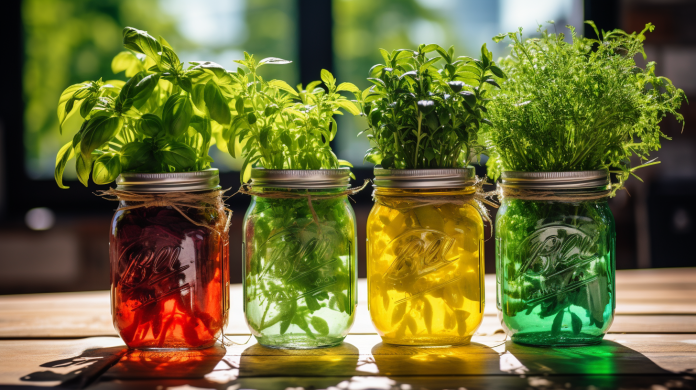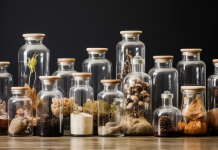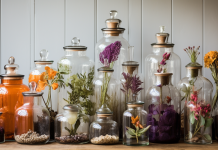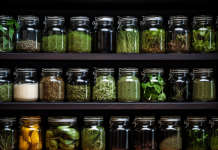By familiarizing oneself with the signs of overwatering and underwatering herbs in glass jars, such as wilting leaves, yellowing or browning of leaves, mold or fungus growth, root rot, and stunted growth, one can effectively address these issues and ensure the thriving of herbs in glass jar cultivation.
Signs of Underwatering – Wilting Leaves
One of the most common signs of underwatering in herbs is the wilting of their leaves. When herbs do not receive enough water, their leaves will start to droop and appear limp. To prevent wilting leaves, it is important to regularly check the moisture levels in the soil and ensure that it is consistently moist but not waterlogged.
Use a well-draining soil mix and provide adequate water when needed. If wilting leaves are already present, it is important to promptly address the issue. Thoroughly water the herb, allowing the water to penetrate the soil and reach the roots. Additionally, placing the herb in a shaded area for a few days can help it recover.
Yellowing or Browning of Leaves
Yellowing or browning of leaves can be indicative of various issues, including nutrient deficiency, pests, and diseases.
Nutrient deficiency, such as a lack of nitrogen, iron, or magnesium, can cause leaves to turn yellow or brown. Pests, such as aphids or spider mites, can also damage the leaves and cause discoloration. Additionally, certain diseases, like fungal infections or viral diseases, can lead to yellowing or browning of leaves.
Signs of Overwatering – Mold or Fungus Growth
This can be a common issue when growing herbs in glass jars, and it is important to be able to recognize the signs in order to prevent further damage to the plants. Preventing moisture buildup is crucial. A well-draining soil mix that allows excess water to flow through and prevents water from being trapped around the roots can help prevent mold and fungus growth. It is important to regularly inspect the plants for any signs of mold or fungus, such as white or gray fuzzy patches on the soil or leaves. Taking immediate action to address the issue can save the herbs from further damage.
| Preventing moisture buildup | Choosing the right soil mixture |
|---|---|
| Ensure proper drainage | Use a well-draining soil mix |
| Avoid overwatering | Prevent water from being trapped |
| Regularly inspect for signs of mold or fungus | Take immediate action to address the issue |
Signs of Overwatering – Root Rot
With proper care and attention, gardeners can prevent root rot in herbs grown in glass jars. Root rot is a common problem that occurs when the roots of plants are exposed to excessive moisture for extended periods. It can lead to the death of the plant if not addressed promptly.
To prevent root rot, it is crucial to manage water levels effectively. Overwatering should be avoided, as it contributes to the development of root rot. Ensure that the soil is well-drained and not waterlogged. Allow the top layer of soil to dry out before watering again.
Adding gravel or pebbles to the base of your jar before any soil can help prevent root rot.
Stunted Growth
Improper watering practices and inadequate nutrient levels can lead to stunted growth in herbs grown in glass jars. Stunted growth occurs when the herbs fail to reach their full potential in terms of size and development. It can be frustrating for herb gardeners who wish to harvest abundant and healthy plants.
However, there are ways to prevent stunted growth and promote healthy growth in herbs.
Ensuring that herbs receive adequate nutrients through proper fertilization is essential. Providing a balanced and appropriate fertilizer will supply the necessary nutrients for optimal growth.
Conclusion
In conclusion, recognizing signs of overwatering and underwatering in herbs grown in glass jars is important for maintaining their health.
Wilting leaves, yellowing or browning of leaves, mold or fungus growth, root rot, and stunted growth are all indications of improper watering.
By being attentive to these signs, gardeners can adjust their watering practices accordingly and ensure the well-being and growth of their herbs.
Please see our supporting articles:
Common Challenges and Solutions for Herbs in Glass Jars



